Van-Tuan Tran
ToFU: Transforming How Federated Learning Systems Forget User Data
Sep 19, 2025Abstract:Neural networks unintentionally memorize training data, creating privacy risks in federated learning (FL) systems, such as inference and reconstruction attacks on sensitive data. To mitigate these risks and to comply with privacy regulations, Federated Unlearning (FU) has been introduced to enable participants in FL systems to remove their data's influence from the global model. However, current FU methods primarily act post-hoc, struggling to efficiently erase information deeply memorized by neural networks. We argue that effective unlearning necessitates a paradigm shift: designing FL systems inherently amenable to forgetting. To this end, we propose a learning-to-unlearn Transformation-guided Federated Unlearning (ToFU) framework that incorporates transformations during the learning process to reduce memorization of specific instances. Our theoretical analysis reveals how transformation composition provably bounds instance-specific information, directly simplifying subsequent unlearning. Crucially, ToFU can work as a plug-and-play framework that improves the performance of existing FU methods. Experiments on CIFAR-10, CIFAR-100, and the MUFAC benchmark show that ToFU outperforms existing FU baselines, enhances performance when integrated with current methods, and reduces unlearning time.
pFedDSH: Enabling Knowledge Transfer in Personalized Federated Learning through Data-free Sub-Hypernetwork
Aug 07, 2025Abstract:Federated Learning (FL) enables collaborative model training across distributed clients without sharing raw data, offering a significant privacy benefit. However, most existing Personalized Federated Learning (pFL) methods assume a static client participation, which does not reflect real-world scenarios where new clients may continuously join the federated system (i.e., dynamic client onboarding). In this paper, we explore a practical scenario in which a new batch of clients is introduced incrementally while the learning task remains unchanged. This dynamic environment poses various challenges, including preserving performance for existing clients without retraining and enabling efficient knowledge transfer between client batches. To address these issues, we propose Personalized Federated Data-Free Sub-Hypernetwork (pFedDSH), a novel framework based on a central hypernetwork that generates personalized models for each client via embedding vectors. To maintain knowledge stability for existing clients, pFedDSH incorporates batch-specific masks, which activate subsets of neurons to preserve knowledge. Furthermore, we introduce a data-free replay strategy motivated by DeepInversion to facilitate backward transfer, enhancing existing clients' performance without compromising privacy. Extensive experiments conducted on CIFAR-10, CIFAR-100, and Tiny-ImageNet demonstrate that pFedDSH outperforms the state-of-the-art pFL and Federated Continual Learning baselines in our investigation scenario. Our approach achieves robust performance stability for existing clients, as well as adaptation for new clients and efficient utilization of neural resources.
Think Twice before Adaptation: Improving Adaptability of DeepFake Detection via Online Test-Time Adaptation
May 24, 2025Abstract:Deepfake (DF) detectors face significant challenges when deployed in real-world environments, particularly when encountering test samples deviated from training data through either postprocessing manipulations or distribution shifts. We demonstrate postprocessing techniques can completely obscure generation artifacts presented in DF samples, leading to performance degradation of DF detectors. To address these challenges, we propose Think Twice before Adaptation (\texttt{T$^2$A}), a novel online test-time adaptation method that enhances the adaptability of detectors during inference without requiring access to source training data or labels. Our key idea is to enable the model to explore alternative options through an Uncertainty-aware Negative Learning objective rather than solely relying on its initial predictions as commonly seen in entropy minimization (EM)-based approaches. We also introduce an Uncertain Sample Prioritization strategy and Gradients Masking technique to improve the adaptation by focusing on important samples and model parameters. Our theoretical analysis demonstrates that the proposed negative learning objective exhibits complementary behavior to EM, facilitating better adaptation capability. Empirically, our method achieves state-of-the-art results compared to existing test-time adaptation (TTA) approaches and significantly enhances the resilience and generalization of DF detectors during inference. Code is available \href{https://github.com/HongHanh2104/T2A-Think-Twice-Before-Adaptation}{here}.
Passive Deepfake Detection Across Multi-modalities: A Comprehensive Survey
Nov 26, 2024Abstract:In recent years, deepfakes (DFs) have been utilized for malicious purposes, such as individual impersonation, misinformation spreading, and artists' style imitation, raising questions about ethical and security concerns. However, existing surveys have focused on accuracy performance of passive DF detection approaches for single modalities, such as image, video or audio. This comprehensive survey explores passive approaches across multiple modalities, including image, video, audio, and multi-modal domains, and extend our discussion beyond detection accuracy, including generalization, robustness, attribution, and interpretability. Additionally, we discuss threat models for passive approaches, including potential adversarial strategies and different levels of adversary knowledge and capabilities. We also highlights current challenges in DF detection, including the lack of generalization across different generative models, the need for comprehensive trustworthiness evaluation, and the limitations of existing multi-modal approaches. Finally, we propose future research directions that address these unexplored and emerging issues in the field of passive DF detection, such as adaptive learning, dynamic benchmark, holistic trustworthiness evaluation, and multi-modal detectors for talking-face video generation.
D-CAPTCHA++: A Study of Resilience of Deepfake CAPTCHA under Transferable Imperceptible Adversarial Attack
Sep 11, 2024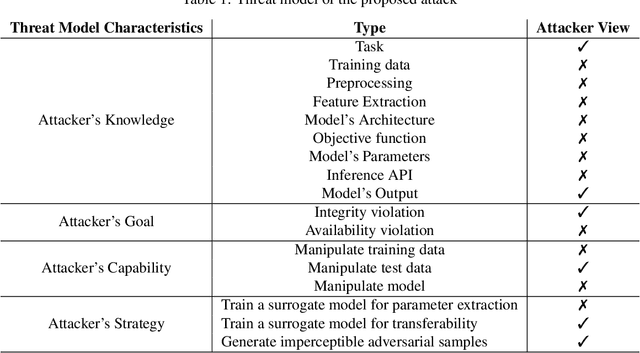
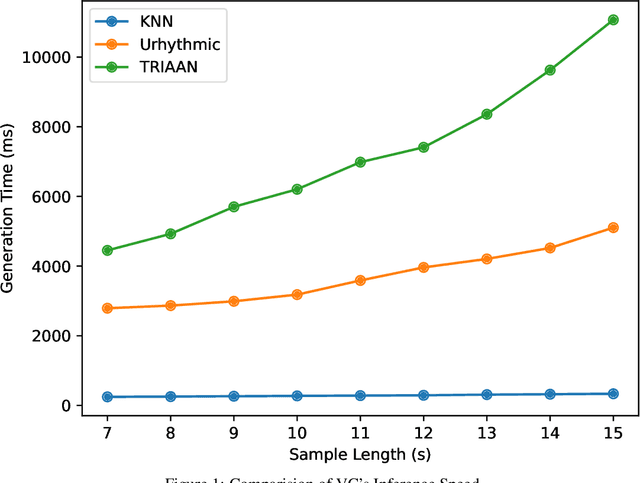
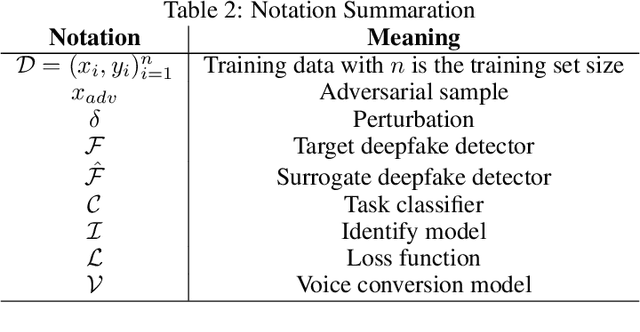
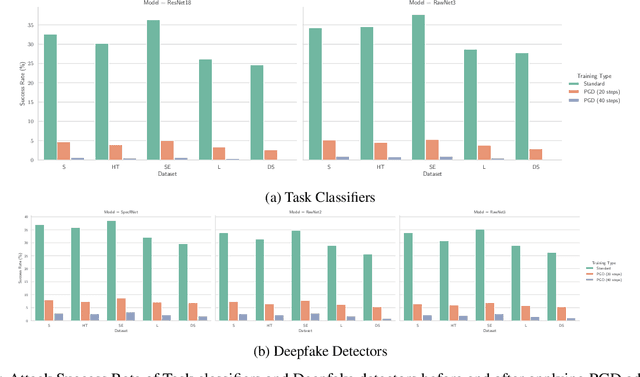
Abstract:The advancements in generative AI have enabled the improvement of audio synthesis models, including text-to-speech and voice conversion. This raises concerns about its potential misuse in social manipulation and political interference, as synthetic speech has become indistinguishable from natural human speech. Several speech-generation programs are utilized for malicious purposes, especially impersonating individuals through phone calls. Therefore, detecting fake audio is crucial to maintain social security and safeguard the integrity of information. Recent research has proposed a D-CAPTCHA system based on the challenge-response protocol to differentiate fake phone calls from real ones. In this work, we study the resilience of this system and introduce a more robust version, D-CAPTCHA++, to defend against fake calls. Specifically, we first expose the vulnerability of the D-CAPTCHA system under transferable imperceptible adversarial attack. Secondly, we mitigate such vulnerability by improving the robustness of the system by using adversarial training in D-CAPTCHA deepfake detectors and task classifiers.
Personalized Privacy-Preserving Framework for Cross-Silo Federated Learning
Feb 22, 2023
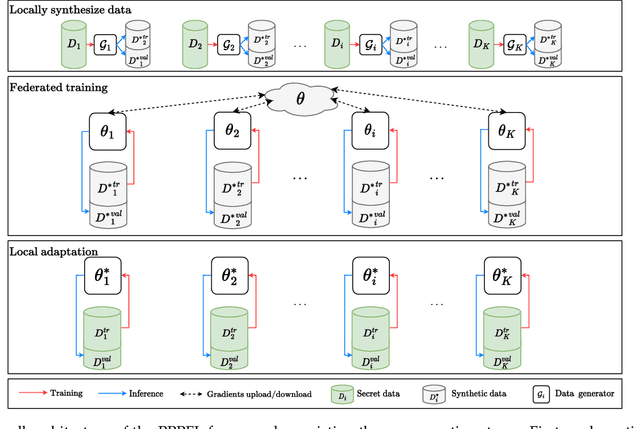
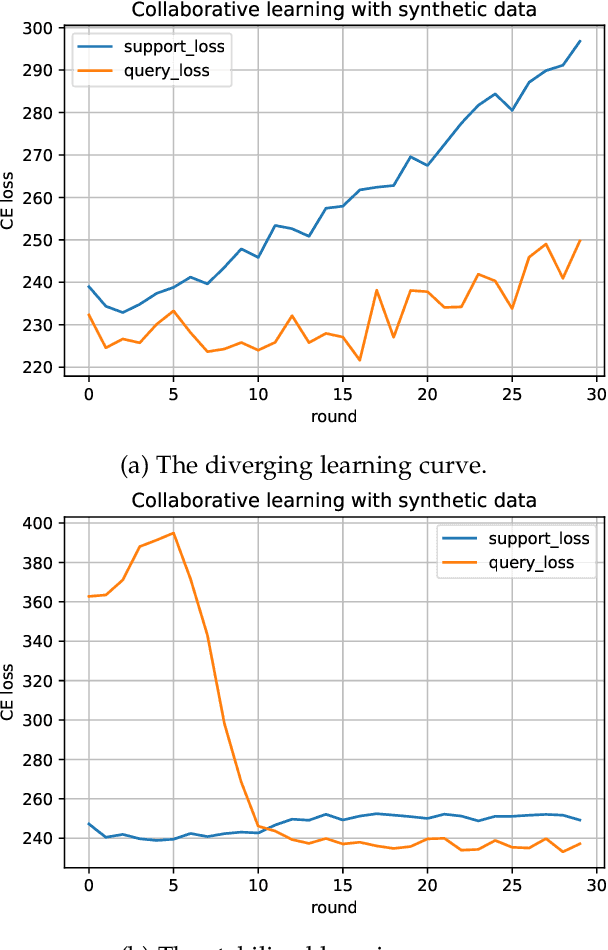

Abstract:Federated learning (FL) is recently surging as a promising decentralized deep learning (DL) framework that enables DL-based approaches trained collaboratively across clients without sharing private data. However, in the context of the central party being active and dishonest, the data of individual clients might be perfectly reconstructed, leading to the high possibility of sensitive information being leaked. Moreover, FL also suffers from the nonindependent and identically distributed (non-IID) data among clients, resulting in the degradation in the inference performance on local clients' data. In this paper, we propose a novel framework, namely Personalized Privacy-Preserving Federated Learning (PPPFL), with a concentration on cross-silo FL to overcome these challenges. Specifically, we introduce a stabilized variant of the Model-Agnostic Meta-Learning (MAML) algorithm to collaboratively train a global initialization from clients' synthetic data generated by Differential Private Generative Adversarial Networks (DP-GANs). After reaching convergence, the global initialization will be locally adapted by the clients to their private data. Through extensive experiments, we empirically show that our proposed framework outperforms multiple FL baselines on different datasets, including MNIST, Fashion-MNIST, CIFAR-10, and CIFAR-100.
 Add to Chrome
Add to Chrome Add to Firefox
Add to Firefox Add to Edge
Add to Edge